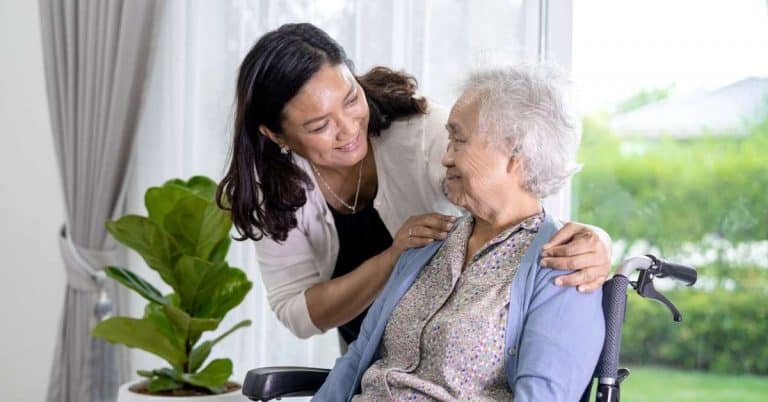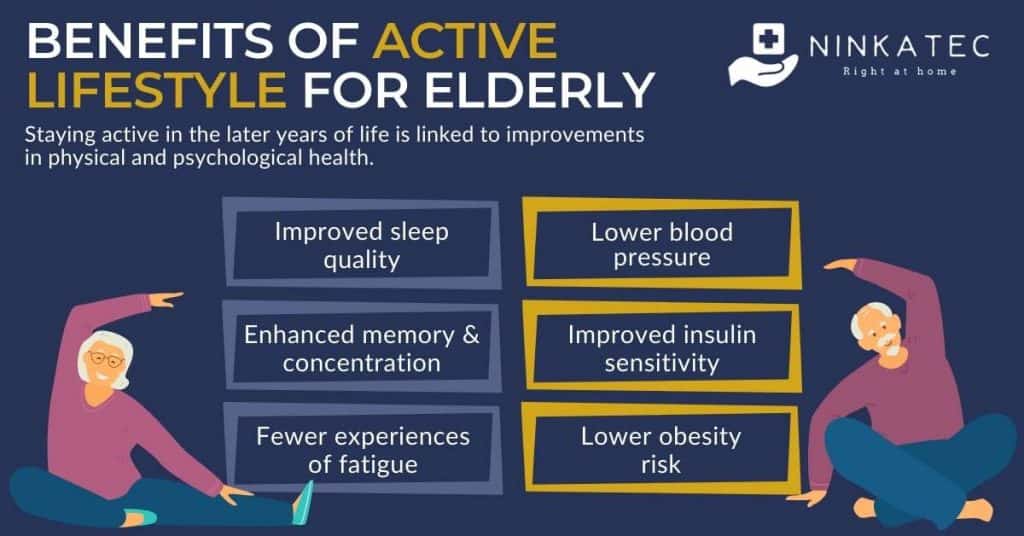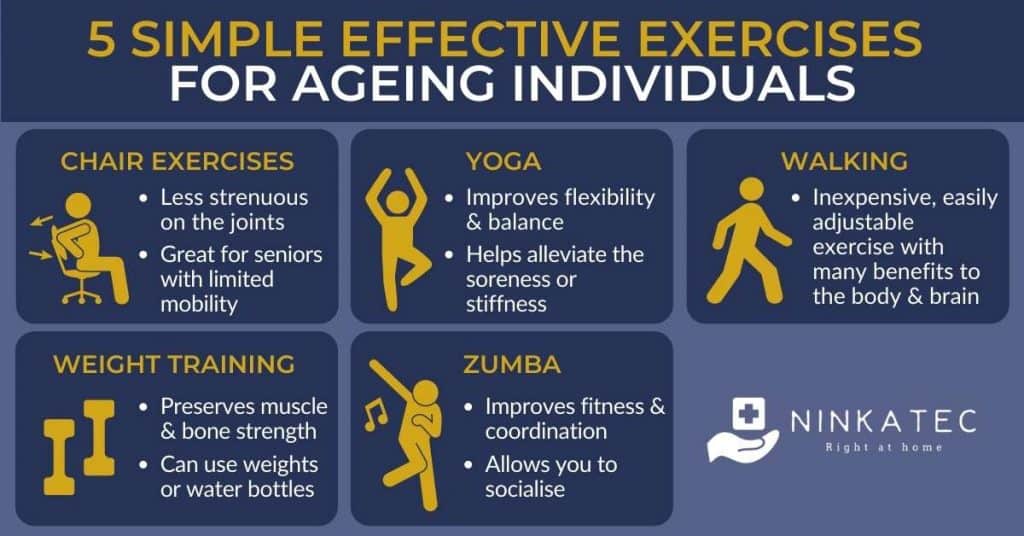The holidays can be a difficult time for elderly individuals to maintain proper diet and exercise. Find out how senior adults can improve their nutrition and fitness!
The holiday season is an exciting time of the year where families and friends get together to spend time with one another. Unfortunately, celebrating the holidays is often accompanied by binge eating, reduced exercise, and unwanted weight gain.
With limited mobility and a slower metabolism, senior loved ones are more susceptible to developing diet-related illnesses from poor holiday eating habits and inadequate exercise. With this in mind. it’s essential to stay healthy by tracking calories and incorporating activities that encourage movement.
In this guide, we discuss how ageing individuals can enjoy the holiday season while staying on top of their nutrition and fitness.
Table of Contents
1. How Diet and Exercise Affect Health
While diet and exercise are important regardless of age, it’s especially essential for the health of elderly individuals. Ageing goes hand in hand with a weaker immune system, which makes seniors more vulnerable to health issues – particularly for patients with existing medical conditions.
Through a balanced diet and regular exercise, elderly folks can reduce their risk of developing diseases like coronary heart disease, diabetes, stroke, and hypertension. Aside from improving their physical health, seniors who stay active also reap the psychological benefits of a greater perceived quality of life and well-being.
2. The Importance of Staying Healthy in the Holiday Season
Traditionally, the holidays are associated with large, festive feasts. A study found that people tend to gain about 0.5 kilograms from mid-November to mid-January and retain the excess pounds. Additionally, study participants who were already overweight or obese showed a higher increase in weight.
Elderly individuals should be mindful of maintaining a healthy weight since their bodies are more vulnerable to diet-related medical conditions. Practising clean eating with proper nutrition helps ageing loved ones keep their immune systems strong and promotes balanced energy levels.
3. Good Nutrition
Families should opt for healthier variations of holiday dishes to maximise enjoyment while minimising health problems down the line. As with all things, practising moderation is key and consuming a wide range of healthy foods will go a long way to ensuring one’s health.
3.1. Tracking Calories for Weight Maintenance
Monitoring daily calories is a simple way to maintain weight. Tracking the calories in each meal helps individuals understand how much more or less they should be eating.
Consider using an app calorie tracker that can estimate how much fat, sodium, and sugar the user has consumed in a day. This helps ensure that elderly loved ones don’t eat an excess of these nutrients.
3.2. Low-Calorie Foods vs High-Calorie Foods
For elderly loved ones with strong appetites, low-calorie and protein-rich foods are generally recommended. Consuming low-calorie-dense foods allows them to eat more without the risk of weight gain. On the other hand, protein-rich foods will keep them feeling satiated for longer periods.
Ageing loved ones with weaker appetites can opt for high-calorie-dense foods to reach their daily maintenance calories easily. Senior adults may have reduced taste bud sensitivity and/or difficulty chewing, which can result in them eating less. To help them get more calories in, consider serving easy-to-eat calorie-packed food like fruit smoothies, potato soup, or pesto pasta. Here's the list of top 8 foods that increase appetite and promote good nutrition in elderly adults.
3.3. Cheat Meals: How to Indulge in a Healthy Way
Eating healthy doesn’t mean that elderly individuals can’t enjoy their favourite meals anymore. With supervision from their nutritionist, ageing loved ones can modify their favourite dishes to make them healthier. They may also enjoy limited quantities of sweets on special occasions like the holidays if they don’t have prescribed dietary restrictions.
As long as seniors are eating healthy food most of the time, a cheat meal or two over the holidays won’t do much harm. It helps to frame an indulgent meal or snack as a positive reward for consistently sticking to their diet. To offset any excess calories, elderly individuals can add an extra 10-20 minutes of exercise in the same week.
4. Active Lifestyle
Senior adults tend to have sedentary lifestyles due to limited mobility and decreased muscle strength. However, studies have found that staying active in the later years of life is linked to improvements in physical and psychological health. Some of these benefits include:
- Improved sleep quality
- Lower blood pressure
- Enhanced memory and concentration
- Lower obesity risk
- Improved insulin sensitivity
- Fewer experiences of fatigue
4.1. Simple Exercises for Ageing Individuals
Generally, ageing adults are recommended to complete 2.5 hours of aerobic exercise every week if possible. They’re also advised to incorporate muscle-strengthening activities and stretching exercises at least two days a week.
Depending on their health conditions, elderly individuals can perform any of the following exercises to help them stay active in the holidays:
- Chair exercises - This type of exercise is great for seniors with very limited mobility. The seated position is less strenuous on the joints but still allows individuals to condition their muscles.
- Yoga - This exercise can improve flexibility and balance. It also helps alleviate the soreness or stiffness that ageing individuals commonly experience.
- Walking - Going for a 30-minute morning walk is an easy way to get low-intensity cardiovascular exercise. Relatives may even accompany their elderly loved ones on their walk to help associate fitness with something positive like social bonding.
- Weight training - Using water bottles or light weights, elderly folks can perform strength training exercises. This helps their bodies retain good motor function and reduce the loss of muscle mass.
- Zumba - Elderly folks who love to dance may consider Zumba as a regular cardio exercise. Like walking, Zumba can be done with the company of their relatives as a family activity.
5. How Ninkatec Supports Nutrition and Fitness in Elderly Clients
Ninkatec is one of the most trusted home healthcare providers in Singapore. Our goal is to promote meaningful living among ageing clients through personalised and convenient home services.
Although it can be challenging, maintaining proper nutrition and adequate exercise throughout the holidays can prevent further health complications. To reduce diet-related health risks, our medical staff assist elderly clients through one of the following care plans:
- Virtual Care - Provides 24/7 remote monitoring and virtual support for elderly patients to ensure that they’re eating well and exercising regularly.
- Right at Home - For patients who have few dietary restrictions and require minimal mobility assistance in exercise.
- Close Connect - For clients who need daily assistance in meal preparation, medical administration, and supervision. This is recommended for patients with chronic health conditions.
6. Stay Healthy During the Holidays with Ninkatec
While it may be challenging to prioritise nutrition and fitness during the holidays, it’s worth the long-term benefits. Scheduling an appointment with Ninkatec can help ageing clients follow their doctor’s prescribed diets and routine exercises – leading to a healthier and longer life.










